
Heroes and Villains is a 1969 post-apocalyptic novel by Angela Carter.

Heroes and Villains is a 1969 post-apocalyptic novel by Angela Carter.
In a post-apocalyptic world, Marianne inhabits an enclave of relative civilisation as the daughter of one of the "Professors", academic survivors of the unnamed global disaster, whose enclave is guarded by a soldier caste. At the beginning of the novel, Marianne has lost her brother and mother, and only her father survives. However, she has become tired of the sedentary lifestyle and runs away from the enclave to join Jewel, an articulate and intelligent leader of a barbarian tribe, but then becomes concerned at her chattel status in a society that has rigid patriarchal concepts of what constitutes appropriate gender roles. Marianne becomes pregnant after Jewel sexually assaults her but she then sexually assaults an intellectually disabled male tribal member. Ultimately Jewel dies, and Marianne plans to become tribal leader. [1] [2]
Writing for The New York Times , Richard Boston found Heroes and Villains to be "a strange, compelling book ... a fable that discusses the roles of reason and imagination in a civilized society." He reported it to be "an undoubted success," saying "Carter tells her story with considerable skill. Her observation is sharp, and she writes extremely well." [3]
Theodore Sturgeon reviewed the novel favourably, praising Carter's "vivid colour, her familiarity with her scene, the unexpectedness of her characters and plot development." [4]

Farnham's Freehold is a science fiction novel by American writer Robert A. Heinlein. A serialised version, edited by Frederik Pohl, appeared in Worlds of If magazine. The complete version was published in novel form by G.P. Putnam later in 1964.

Apocalyptic and post-apocalyptic fiction is a subgenre of science fiction in which the Earth's civilization is collapsing or has collapsed. The apocalypse event may be climatic, such as runaway climate change; astronomical, such as an impact event; destructive, such as nuclear holocaust or resource depletion; medical, such as a pandemic, whether natural or human-caused; end time, such as the Last Judgment, Second Coming or Ragnarök; or any other scenario in which the outcome is apocalyptic, such as a zombie apocalypse, cybernetic revolt, technological singularity, dysgenics or alien invasion.
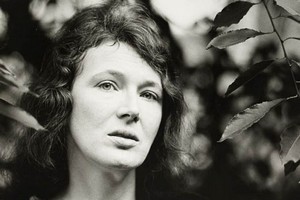
Angela Olive Pearce, who published under the name Angela Carter, was an English novelist, short story writer, poet, and journalist, known for her feminist, magical realism, and picaresque works. She is mainly known for her book The Bloody Chamber (1979). In 1984, her short story "The Company of Wolves" was adapted into a film of the same name. In 2008, The Times ranked Carter tenth in their list of "The 50 greatest British writers since 1945". In 2012, Nights at the Circus was selected as the best ever winner of the James Tait Black Memorial Prize.

Jerri Manthey is an American actress and television personality. She is perhaps best remembered as a polarizing figure from Survivor, on which she was a three-time contestant: she placed 8th on Survivor: The Australian Outback, she came 10th on Survivor: All-Stars, and was eliminated at the Final Four on Survivor: Heroes vs. Villains.

The Passion of New Eve is a novel by Angela Carter, first published in 1977. The book is set in a dystopian United States where civil war has broken out between different political, racial and gendered groups. A dark satire, the book parodies primitive notions of gender, sexual difference and identity from a post-feminist perspective. Other major themes include sadomasochism and the politics of power. Carter described the book as feminist black comedy.
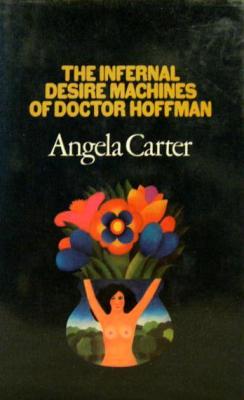
The Infernal Desire Machines of Doctor Hoffman, published in the United States as The War of Dreams, is a 1972 novel by Angela Carter. This picaresque novel is heavily influenced by surrealism, Romanticism, critical theory, and other branches of Continental philosophy. Its style is an amalgam of magical realism and postmodern pastiche. The novel has been called a theoretical fiction, as it clearly engages in some of the theoretical issues of its time, notably feminism, mass media and the counterculture.

Angela is a superhero appearing in American comic books published by Image Comics and Marvel Comics. Created by author Neil Gaiman and artist Todd McFarlane, the character first appeared in Spawn #9, in McFarlane's creator-owned series Spawn, and later starring in her own self-titled miniseries. She is an angel and a bounty hunter, working under the auspices of Heaven to oppose Spawn.

Forgotten Realms: Demon Stone is an action role-playing video game released in 2004 for PlayStation 2, Xbox and Microsoft Windows. It is set in the Forgotten Realms campaign setting for Dungeons & Dragons (D&D). The story was written by R.A. Salvatore and features the voices of Patrick Stewart as Khelben "Blackstaff" Arunsun and Michael Clarke Duncan as Ygorl.

Korvac is the name of a fictional character appearing in American comic books published by Marvel Comics. He first appears in Giant-Size Defenders #3 and was created by Steve Gerber and Jim Starlin.

Hawkman is a superhero appearing in American comic books published by DC Comics. He is the first character to use the name Hawkman. There are two separate origins of Carter Hall; the Golden Age origin and the Post-Hawkworld origin.

The Year of the Flood is a novel by Canadian author Margaret Atwood, the second book of her dystopian trilogy, released on September 22, 2009, in Canada and the United States, and on September 7, 2009, in the United Kingdom. The novel was mentioned in numerous newspaper review articles looking forward to notable fiction of 2009.
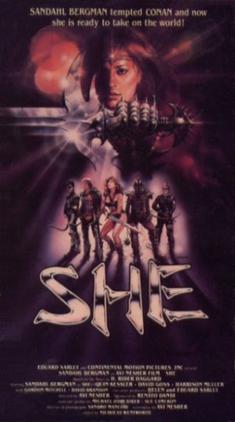
She is a post apocalyptic film directed by Avi Nesher and starring Sandahl Bergman. She was based on H. Rider Haggard's 1887 novel She: A History of Adventure.

Facial Justice is a dystopian novel by L. P. Hartley, published in 1960. The novel depicts a post-apocalyptic society that has sought to banish privilege and envy, to the extent that people will even have their faces surgically altered in order to appear neither too beautiful nor too ugly. The novel was included in Anthony Burgess' essay Ninety-nine Novels.
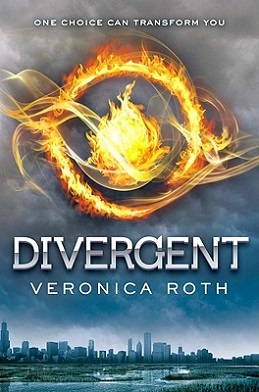
Divergent, the debut novel of American novelist Veronica Roth, was published by HarperCollins Children's Books in 2011. The novel is the first in the Divergent series, a trilogy of young adult dystopian novels set in a post-apocalyptic version of Chicago. The society defines its citizens by their social and personality-related affiliation with one of five factions. This rigid system has removed the threat of anyone exercising independent will and re-threatening the population's safety. In the story, Beatrice Prior joins the ranks of the Dauntless and explores her new identity as "Tris". Underlying the action- and dystopian-focused main plot is a romantic subplot between Tris and "Four", one of her instructors in the Dauntless faction.
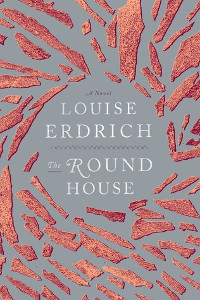
The Round House is a novel by the American writer Louise Erdrich first published on October 2, 2012 by HarperCollins. The Round House is Erdrich's 14th novel and is part of her "justice trilogy" of novels, which includes The Plague of Doves released in 2008 and LaRose in 2016. The Round House follows the story of Joe Coutts, a 13-year-old boy who is frustrated with the poor investigation into his mother's gruesome attack and sets out to find his mother's attacker with the help of his best friends, Cappy, Angus, and Zack. Like most of Erdrich's other works, The Round House is set on an Ojibwe reservation in North Dakota.

Jewel Limar Prestage was an American political scientist, citizen activist, educator, mentor, and author. She is the first African-American woman to receive a doctorate in political science in the United States. Prestage mentored many others in her field, which is how she received the title, "The Mother of Black Political Science." Prestage conducted ample research on African Americans' role in the political process. In 1977, she co-authored the anthology A Portrait of Marginality, which examines the political socialization of Black women.
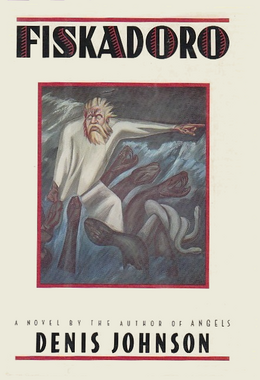
Fiskadoro is post-apocalyptic novel by Denis Johnson published in 1985 by Alfred A. Knopf.

The Marvel Cinematic Universe (MCU) is an American media franchise and shared universe that involves productions of superhero films and television series. These productions star various titular superheroes; they are independently produced by Marvel Studios and are based on characters that appear in American comic books published by Marvel Comics. The shared universe, much like the original Marvel Universe in comic books, was established by crossing over common plots, settings, casts, and characters.